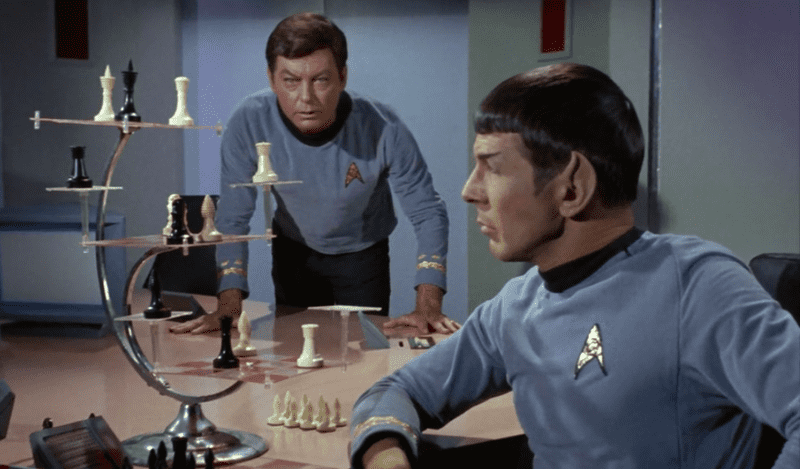Your head hurts. It’s hard to understand all of the moving parts. Meetings go in circles. You feel like you are playing a game of three-dimensional chess on a rocking boat, jet-lagged, with your hands tied behind your back. There’s progress, but it is extremely painful.
 https://en.wikipedia.org/wiki/Three-dimensional_chess#Star_Trek_Tri-Dimensional_ChessThe interesting thing here is that with great cognitive force and fortitude we can “manage” these situations. Throw enough people and process at the problem and you can, at least for a short period of time, establish some sense of “control”. When this state starts to pervade how we conceive of our work (“how things work”)
https://en.wikipedia.org/wiki/Three-dimensional_chess#Star_Trek_Tri-Dimensional_ChessThe interesting thing here is that with great cognitive force and fortitude we can “manage” these situations. Throw enough people and process at the problem and you can, at least for a short period of time, establish some sense of “control”. When this state starts to pervade how we conceive of our work (“how things work”)
, you simply stop noticing. It manifests as low/mid level institutionalized anxiety.
Contrast this with situations that are challenging, but feel invigorating and energizing (frequently referred to as flow states). These situations aren’t easy but the sensation is different. Most product development teams know that sense of confusion at the start of an initiative. You go in circles, make mistakes, and struggle for shared understanding. But there’s still movement. The way forward emerges from the fog, and you find your groove (until the next big challenge).
One mode feels like being a member of a Co Op board in NYC. The other mode feels like climbing Everest. “Hey people this is insane. People climb ****ing Everest, and we can’t figure this co-op shit out?!!?”
 http://www.nationalgeographic.com/adventure/everest/gear-edmund-hillary-hilaree-oneill/#/49925.jpgWhen I hear people complain about a lack of process, ownership, accountability, predictability, or discipline, I immediately suggest taking a step back and thinking about flow. In our quest for certainty we tend to adopt layers of process/control that, while providing a safety blanket, do little to forward our end goal(s). Worse still is that we equate “real” business (or “real world business”)
http://www.nationalgeographic.com/adventure/everest/gear-edmund-hillary-hilaree-oneill/#/49925.jpgWhen I hear people complain about a lack of process, ownership, accountability, predictability, or discipline, I immediately suggest taking a step back and thinking about flow. In our quest for certainty we tend to adopt layers of process/control that, while providing a safety blanket, do little to forward our end goal(s). Worse still is that we equate “real” business (or “real world business”)
with these impediments.
In this mindset, the quest for execution, accountability, and predictability supersedes actual outcomes. This kicks off a wicked cycle where outcomes are lacking, and more management/complexity is added to solve the problem. We try to cure the symptoms.
I always ask teams:
- What is the wedge we could drive into this problem such that we could stop talking, and start doing?
- What constraints are we actually operating under? Why? Can these be removed?
- How does this experience compare to your most rewarding work-related flow states ? Why can’t it be like that? These days it is common to describe our environments as “complex”. But it is important to remember that complexity does not doom us to cognitive overload or a complicated approach. Complexity is not an excuse. It is an opportunity for innovation.
When your head hurts …. that’s a sign. You’re not addressing the root cause. Take a step back. Observe. Save yourself from burnout. Speak up. Figure out how to achieve flow. Figure out how to climb a mountain, instead of navigate a maze.
